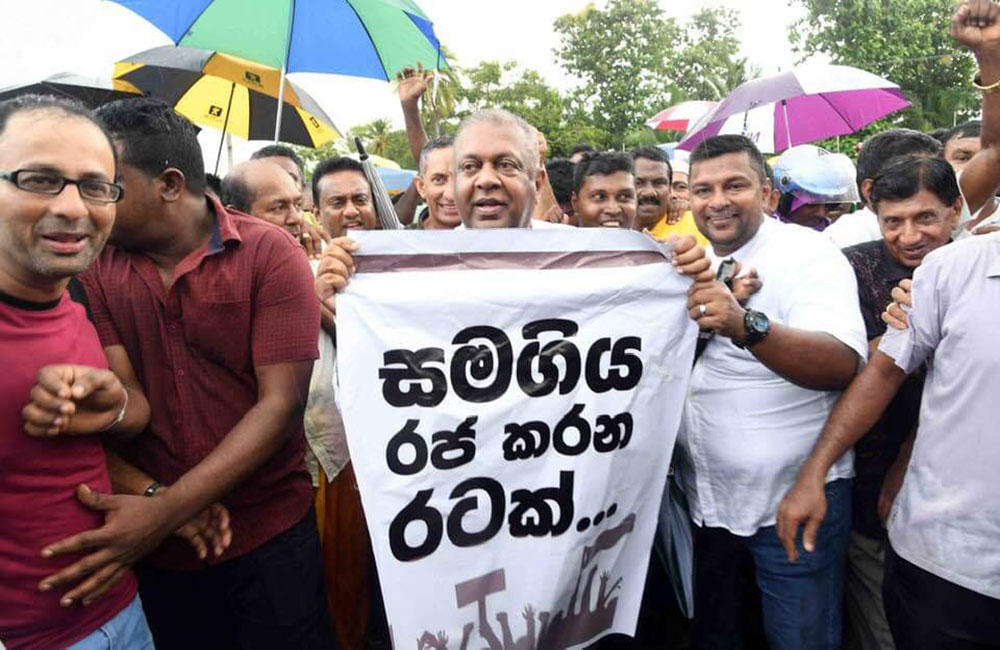Mangala challenges the politics of division
By Harim Peiris
Finance Minister Mangala Samaraweera, who recently celebrated 30 years in public life, is certainly no ordinary politician. He has always, throughout his career, been more of a leader, than a follower and generally challenged conventional political wisdom and done so, mostly successfully. During his youthful beginnings in politics, during the second JVP insurrection, he fought hard for human rights and the cause of the disappeared. When the southern SLFP leadership was toying with boycotting the 1989 general election, he jumped into the fray.
As a young freshman SLFP parliamentarian in 1989, he was a key operative in seeking the easing upstairs of the iconic Madam Sirimavo Bandaranaike and the induction of the next generation of leadership under Chandrika Bandaranaike Kumaratunga. As CBK then resolutely swung the SLFP, from the opponent of provincial councils, into an enlightened political party presenting a political package of accommodation and inclusiveness, Mangala Samaraweera was at the forefront of that change through the "Sudu-Nelum" movement.
In more recent times, he was one of the earliest nay-sayers about the Rajapakse regime’s excesses, from its own front benches as Foreign Minister and his critique of its human rights and forecast of its international consequences was almost prophetic in their accuracy and remarkable in its foresight. During the current post 2015 dispensation, Mangala took the leadership on the delivery of national reconciliation as Foreign Minister and now as Finance Minister, he is spearheading the next generation of essential reforms and our tortuously slow economic recovery from the expensive Chinese debt funded, allegedly corrupt, budget busting white elephant projects of the previous era.
Unifying rather than dividing
So, Minister Mangala Samaraweera is a clear opinion leader and a catalyst for change. Recently, especially in the aftermath of the horrendous Easter bomb attacks, he has been articulating a unifying vision of us coming together as a nation to face our common enemy. This is in the context, where the predominant political response, after the initial calm created by the Christian community’s resolute decision to forgive and not retaliate, has been to divide and hate monger. He has also not been reluctant to take on the sacred cows of our religious leaders, when they are engaging in more temporal pursuits such as "fasts unto deaths" and open support for the same.
Sri Lanka is a deeply divided society. We are divided along every possible social fault line imaginable. We are divided along ethnic, religious, linguistic, caste and class lines. Sri Lanka has essentially failed post-independence to forge a multi-ethnic, multi-religious, multi-lingual national identity which over aches our more parochial ethno-religious identities. In fact, our giant neighbour India has done a remarkable job in creating such a national Indian identity from a mosaic of different ethno-linguistic groups. The goal of a Sri Lankan identity remains elusive and the task of reforms towards a Sri Lankan state which accommodates the diversity of her peoples is challenging.
Sri Lankan politics and politicians, and not least allied industries such as media, basically at some level play off on the divisions in our society, to seek leadership. As Mangala wrote in his recent essay of 5th June titled The Cardinal Sin. I quote, "When a political party, media organization or religious leader depends for their survival on one group of Sri Lankans becoming afraid of another, we must be wary of them".
Identifying the real enemy
Sri Lanka’s post-Independence history has witnessed people fighting. At the outset we disenfranchised the Tamils of Indian decent, then we got rid of the Burghers, then fought along economic class lines under the JVP banner, simultaneously engaging in a near ruinous civil war with the Tamil community and post-war launched an assault on the Muslim community’s business interests under the guise of anti-halal, poisoned toffees and every other imagined paranoia we could come up.
Sri Lanka and specifically the Christian community, in both their Roman Catholic and non-Roman traditions were the victims of a radical Islamic group’s terrorist attack. Mercifully and with full credit to our security forces, no further attacks were allowed and the terror network degraded beyond offensive capability. However, as Mangala Samaraweera so clearly articulates, the response to violent Islamic extremism is not anti-Islamic extremism or Islamophobia. In fact, the wave of anti-Muslim violence has been distracting and diverting the attention of the law enforcement and the security forces. Further violence and discrimination against an entire community for the actions of a few, is a sure recipe for radicalizing the majority. It is the path we trod in the 1980s vis-a-vis Tamil militants and the Tamil community and we must not repeat those mistakes. As the reports from the Parliamentary Select Committee (PSC) probing the attacks are revealing, we had information on the terror cells developing in Kathankudy from the Muslim community itself. But the state chose to take no action, until an attack took place and have now closed the stable door once the horse has bolted. We are now obsessed with chasing red herrings of sterilizing gynecologists, rather than tracking down any remaining foreign-trained ISIS terrorists and hate mongers and rabble rousers of whatever hue and persuasion.
The real enemy of Sri Lanka, are those that seek to divide us. For united in our diversity we stand and divided we fall.
